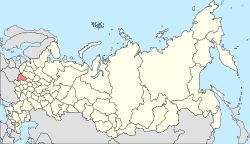Lyubavichi, Rudnyansky District, Smolensk Oblast
| Lyubavichi (English) Любавичи (Russian) ליובאוויטש (Yiddish) |
|
|---|---|
| - Rural locality - Village |
|
 Aerial view of Lyubavichi |
|
 Location of Smolensk Oblast in Russia |
|
|
|
|
|
|
|
| Administrative status (as of September 2008) | |
| Country | Russia |
| Federal subject | Smolensk Oblast |
| Administrative district | Rudnyansky District |
| Rural settlement | Lyubavichskoye Rural Settlement |
| Administrative center of | Lyubavichskoye Rural Settlement |
| Municipal status (as of April 2006) | |
| Municipal district | Rudnyansky Municipal District |
| Rural settlement | Lyubavichskoye Rural Settlement |
| Administrative center of | Lyubavichskoye Rural Settlement |
| Statistics | |
| Area | 1.44 km2 (0.56 sq mi) |
| Population (2007 est.) | 460 inhabitants |
| Density | 319.44/km2 (827.3/sq mi) |
| Time zone | MSK (UTC+03:00) |
| First mentioned | c. 1654 |
| Postal code(s) | 216774 |
| Dialing code(s) | +7 48141 |
Lyubavichi (Russian: Люба́вичи; Yiddish: ליובאוויטש, Lyubavitsh; Polish: Lubawicze) is a rural locality (a village) in Rudnyansky District of Smolensk Oblast, Russia.
The village is known to have existed in what was the Polish-Lithuanian Commonwealth since at least 1654. In 1784, it was mentioned as a small town, then a possession of the magnate Lubomirski family. After the Partition of Poland, the village was annexed by the Russian Empire. During the French invasion of Russia in 1812, the village was occupied by Napoleonic troops for two weeks.
In the days of the Russian Empire, the village was a shtetl in Orshansky Uyezd of Mogilev Governorate. In 1857, it had a population of 2,500. According to another source from ca.1880, a total of 1516 inhabitants (978 Jews) were reported there. The village had 313 houses, two Russian Orthodox churches and two shuls, Jewish houses of prayer.
In the late 19th–early 20th centuries, the largest market in Mogilev Governorate, with a turn-over of over 1.5 million rubles, was held in Lyubavichi. After the October Revolution, the Hasidic leadership left Lyubavichi. The Jewish population of the village gradually declined and secularized under pressure of the Communist government.
...
Wikipedia

